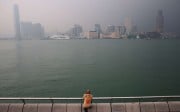The Chinese air force’s unprecedented drills in the Western Pacific on Sunday are just the beginning, military experts say as they predict more large joint operational exercises in the region in future.
The long-range drills and patrols – that involved more than 40 aircraft from different aviation teams – were to display China’s ability to counter US interference in theSouth China Sea issues, the experts said.
Air force spokesman Shen Jinke said H-6K bombers, Su-30 fighters and air tankers conducted reconnaissance and early warning drills, simulated attacks on sea targets, and carried out in-flight refuelling.
Aircraft had “systematically” flown over Japan’s Miyako Strait, with bombers and fighters carrying out “routine” patrols in the air defence identification zone (ADIZ), which Beijing established in the East China Sea in late 2013.
Shen said “regular long-range drills in the Western Pacific and patrols over the East China Sea ADIZ were for the air force to safeguard China’s sovereignty, national security and peaceful development”.
It was the second drill in the region this month, and the sixth time the air force had flown over the so-called first island-chain blockade, a term that refers to major archipelagos along the East Asian continental coast where the United States is trying to contain China, state media reported.
The drill near Okinawa caused Japan’s Maritime Self-Defence Force to scramble fighter jets after discovering eight Chinese planes flying over the strait.
Song Zhongping, a Beijing-based military expert, said the drills targeted not only Japan but also “the US-Japan military alliance”.
“The strongest opponent of the air force of the People’s Liberation Army is not Japan, but the US-Japan military alliance,” Song said, adding that Washington was Beijing’s ultimate rival.
The drill “aims to point to the US’ naval base in Guam, which is the bridgehead for Washington to contain China in the region”.
Song said that China believed the ongoing “Exercise Valiant Shield”, which kicked off on September 12 and involved in 22,000 US troops, was also targeted at China.
Song said the distance involved in staging drills from the mainland to the West Pacific was almost equal to the distance involved in sending jets from Hainan province to the southernmost parts of the South China Sea, hinting the air force was capable of doing similar long-range drills in the contested waters.
Beijing claims almost all of the South China Sea, where Vietnam, the Philippines, Brunei, and Malaysia, as well as Taiwan are also claimants. The Permanent Court of Arbitration in The Hague ruled against China’s territorial claims over the area in July, a decision the Chinese government has refused to acknowledge.
Beijing-based naval expert Li Jie said the Sunday drill had proved that the air force could now operate across the entire chain of the computerised command, control, communications, intelligence, surveillance and reconnaissance systems the US military used.
“The PLA Navy has also broken the first island-chain blockade and sailed into the Western Pacific so many times,” Li said. “In order to show the Chinese military’s joint operational achievements, it’s very likely that the air force, navy and other supporting forces like the rocket force, will have joint exercises in the Western Pacific Ocean in the coming future.”
Video footage from state broadcaster CCTV showed that the aircraft taking part in the drill came from different military airports across the mainland, including Jiangsu’s capital city Nanjing and Anhui’s Wuhu, as well as the air force’s secret training base in Jiuquan’s Jinta country in remote western Gansu province, according to Macau-based military observer Antony Wong Dong.
Designation and serial numbers on the aircraft showed the drill involved the most types of warplanes yet, and the exercises had caused a certain “deterrent effect” on neighbouring countries involved in territorial disputes with China.

















No comments:
Post a Comment